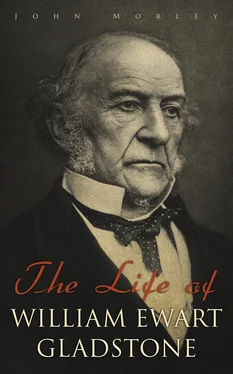John Morley
The Life of William Ewart Gladstone
Complete Edition (Vol. 1-3)
e-artnow, 2020
Contact: info@e-artnow.org
EAN: 4064066386931
Volume 1 VOLUME 1 Table of Contents
Volume 2
Volume 3
Table of Contents Table of Contents Volume 1 VOLUME 1 Table of Contents Volume 2 Volume 3
Table of Contents
Book I. 1809-1831
Chapter I. Childhood
Chapter II. Eton
Chapter III. Oxford
Book II. 1882-1846
Chapter I. Enters Parliament
Chapter II. The New Conservatism and Office
Chapter III. Progress in Public Life
Chapter IV. The Church
Chapter V. His First Book
Chapter VI. Characteristics
Chapter VII. Close of Apprenticeship
Chapter VIII. Peel's Government
Chapter IX. Maynooth
Chapter X. Triumph of Policy and Fall of the Minister
Chapter XI. The Tractarian Catastrophe
Book III. 1847-1852
Chapter I. Member for Oxford
Chapter II. The Hawarden Estate
Chapter III. Party Evolution—New Colonial Policy
Chapter IV. Death of Sir Robert Peel
Chapter V. Gorham Case—Secession of Friends
Chapter VI. Naples
Chapter VII. Religious Tornado—Peelite Difficulties
Chapter VIII. End of Protection
Book IV. 1853-1859
Chapter I. The Coalition
Chapter II. The Triumph of 1853
Chapter III. The Crimean War
Chapter IV. Oxford Reform—Open Civil Service
Chapter V. War Finance—Tax or Loan
Chapter VI. Crisis of 1855 and Break-up of the Peelites
Chapter VII. Political Isolation
Chapter VIII. General Election—New Marriage Law
Chapter IX. The Second Derby Government
Chapter X. The Ionian Islands
Chapter XI. Junction with the Liberals
Appendix Choice of Profession
Chronology
The material on which this biography is founded consists mainly, of course, of the papers collected at Hawarden. Besides that vast accumulation, I have been favoured with several thousands of other pieces from the legion of Mr. Gladstone's correspondents. Between two and three hundred thousand written papers of one sort or another must have passed under my view. To some important journals and papers from other sources I have enjoyed free access, and my warm thanks are due to those who have generously lent me this valuable aid. I am especially indebted to the King for the liberality with which his Majesty has been graciously pleased to sanction the use of certain documents, in cases where the permission of the Sovereign was required.
When I submitted an application for the same purpose to Queen Victoria, in readily promising her favourable consideration, the Queen added a message strongly impressing on me that the work I was about to undertake should not be handled in the narrow way of party. This injunction represents my own clear view of the spirit in which the history of a career so memorable as Mr. Gladstone's should be composed. That, to be sure, is not at all inconsistent with our regarding party feeling in its honourable sense, as entirely the reverse of an infirmity.
The diaries from which I have often quoted consist of forty little books in double columns, intended to do little more than record persons seen, or books read, or letters written as the days passed by. From these diaries come several of the mottoes prefixed to our chapters; such mottoes are marked by an asterisk.
The trustees and other members of Mr. Gladstone's family have extended to me a uniform kindness and consideration and an absolutely unstinted confidence, for which I can never cease to owe them my heartiest acknowledgment. They left with the writer an unqualified and undivided responsibility for these pages, and for the use of the material that they entrusted to him. Whatever may prove to be amiss, whether in leaving out or putting in or putting wrong, the blame is wholly mine.
J. M.
1903.
BOOK I
1809-1831
INTRODUCTORY
I am well aware that to try to write Mr. Gladstone's life at all—the life of a man who held an imposing place in many high national transactions, whose character and career may be regarded in such various lights, whose interests were so manifold, and whose years bridged so long a span of time—is a stroke of temerity. To try to write his life to-day, is to push temerity still further. The ashes of controversy, in which he was much concerned, are still hot; perspective, scale, relation, must all while we stand so near be difficult to adjust. Not all particulars, more especially of the latest marches in his wide campaign, can be disclosed without risk of unjust pain to persons now alive. Yet to defer the task for thirty or forty years has plain drawbacks too. Interest grows less vivid; truth becomes harder to find out; memories pale and colour fades. And if in one sense a statesman's contemporaries, even after death has abated the storm and temper of faction, can scarcely judge him, yet in another sense they who breathe the same air as he breathed, who know at close quarters the problems that faced him, the materials with which he had to work, the limitations of his time—such must be the best, if not the only true memorialists and recorders.
Every reader will perceive that perhaps the sharpest of all the many difficulties of my task has been to draw the line between history and biography—between the fortunes of the community and the exploits, thoughts, and purposes of the individual who had so marked a share in them. In the case of men of letters, in whose lives our literature is admirably rich, this difficulty happily for their authors and for our delight does not arise. But where the subject is a man who was four times at the head of the government—no phantom, but dictator—and who held this office of first minister for a longer time than any other statesman in the reign of the Queen, how can we tell the story of his works and days without reference, and ample reference, to the course of events over whose unrolling he presided, and out of which he made history? It is true that what interests the world in Mr. Gladstone is even more what he was, than what he did; his brilliancy, charm, and power; the endless surprises; his dualism or more than dualism; his vicissitudes of opinion; his subtleties of mental progress; his strange union of qualities never elsewhere found together; his striking unlikeness to other men in whom great and free nations have for long periods placed their trust. I am not sure that the incessant search for clues through this labyrinth would not end in analysis and disquisition, that might be no great improvement even upon political history. Mr. Gladstone said of reconstruction of the income-tax that he only did not call the task herculean, because Hercules could not have done it. Assuredly, I am not presumptuous enough to suppose that this difficulty of fixing the precise scale between history and biography has been successfully overcome by me. It may be that Hercules himself would have succeeded little better.
Some may think in this connection that I have made the preponderance of politics excessive in the story of a genius of signal versatility, to whom politics were only one interest among many. No doubt speeches, debates, bills, divisions, motions, and manœuvres of party, like the manna that fed the children of Israel in the wilderness, lose their savour and power of nutriment on the second day. Yet after all it was to his thoughts, his purposes, his ideals, his performances as statesman, in all the widest significance of that lofty and honourable designation, that Mr. Gladstone owes the lasting substance of his fame. His life was ever ' greatly absorbed ,' he said, ' in working the institutions of his country .' Here we mark a signal trait. Not for two centuries, since the historic strife of anglican and puritan, had our island produced a ruler in whom the religious motive was paramount in the like degree. He was not only a political force but a moral force. He strove to use all the powers of his own genius and the powers of the state for moral purposes and religious. Nevertheless his mission in all its forms was action. He had none of that detachment, often found among superior minds, which we honour for its disinterestedness, even while we lament its impotence in result. The track in which he moved, the instruments that he employed, were the track and the instruments, the sword and the trowel, of political action; and what is called the Gladstonian era was distinctively a political era.
Читать дальше









![William Frith - John Leech, His Life and Work. Vol. 1 [of 2]](/books/747171/william-frith-john-leech-his-life-and-work-vol-thumb.webp)


![William Frith - John Leech, His Life and Work, Vol. 2 [of 2]](/books/748201/william-frith-john-leech-his-life-and-work-vol-thumb.webp)